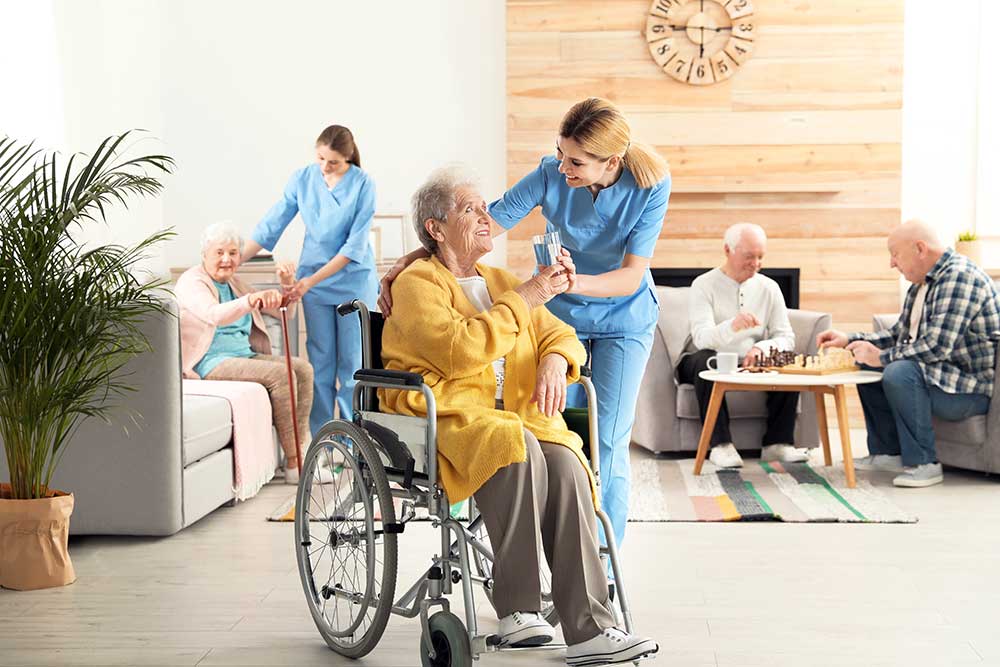Fighting Deadly Disease Outbreaks In Nursing Homes

Nursing homes and long-term care facilities accounted for more than 50,000 COVID-19 fatalities in the United State, according to a Wall Street Journal report published on June 16, 2020.
That’s more than 40% of the total reported deaths in the U.S., and it’s a sobering statistic as families and patients struggle with visitation bans, and as the world wonders how society can maintain strict distancing and sanitation policies as part of its “new normal”.
How can nursing homes protect their patients and staff moving forward, and how can long-term care administrators reassure families that they’re following guidelines for coronavirus deep cleaning and personal protection equipment (PPE) discipline?
Issues with COVID-19 oversight in nursing homes
Licensed long-term care facilities (LTCFs) follow stringent guidelines to prevent and contain infections and outbreaks of previously-known contagious diseases, including seasonal flu, MRSA, c. difficile, e. coli, and other drug-resistant pathogens that cause internal and external infections.
According to the Centers for Disease Control (CDC), one to three million of these types of infections occur in LTCFs each year, resulting in an estimated 380,000 deaths.
Pre-coronavirus pandemic, state health agencies maintained their own inspection protocols and frequency, generally requiring on-site inspections every six to 24 months.
In a time when oversight might be considered a priority, many states have delayed inspections or transitioned to remote inspections by surveying staff and administrators over the phone.
The Center for Medicare Advocacy contends in a recent report that data supplied by these surveys is unreliable, grossly exaggerating LTCF diligence in maintaining infection control protocols.
Patient and family complaints would trigger additional inspections, and given that loved ones provide a valuable layer of accountability in LTCF services, bans on visitations pose a threat to facility oversight, even if they greatly reduce the risk of coronavirus outbreaks.
Are nursing home and retirement staff overburdened?
“While the media and public health efforts have largely focused on hospitals, our staff are heroes too — going to work each day and putting themselves and their families at risk in settings that have not been prioritized for PPE, testing, or funding” —Erin Shvetzoff Hennessey, CEO, Health Dimensions Group, to Skilled Nursing News
Long-term care facilities aren’t necessarily to blame for the problems associated with remote oversight policies and failures to maintain elevated health security protocols.
Skilled Nursing News polled nursing, retirement, and veteran homes CEOs to ask what challenges their organizations continue to face, and what they think will empower them, during the COVID-19 pandemic. Here are the highlights:
- Expedited interstate licensing for nurses and doctors: “The lag time by some states’ boards of nursing impeded our ability (to get assistance)”, said Karen McDonald, Chief Clinical Officer, Mission Health Communities. McDonald also calls for prioritized placement for supportive services in non-medical services.
- Uniform, nationwide regulation and inspection guidelines: “Currently, we are finding a patchwork of federal and state regulations and support that are often in conflict, which wastes precious time and frankly endangers lives,” said Genesis HealthCare CEO George Hager. “A single set of rules for all states to follow consistently is critical; otherwise, administrative bureaucracy is taking attention away from clinical care.”
- Increased stockpile of and funding for PPE: All those interviewed brought up the cost and availability of masks, and eye protection. “Our PPE utilization is, on average, 20 times more per day compared to usage prior to this pandemic, and costs have increased an average of 300% to 700% because of supply chain issues,” Hager said.
In a May, 2020 interview, Connecticut LTC ombudsman Mairead Painter told Fierce Healthcare that “We need to have enough staff to appropriately support the staff in there who are putting their lives on the line. When you’re working short, you make decisions you may not make on a good day.”
How can biohazard cleaning companies help?
The psychological and physical toll nursing home workers experience during this pandemic have contributed to burnout and turnover.
So have concerns that exposure in a high-risk environment will endanger their own loved ones at home. The time and expense spent training new employees in the ever-fluid requirements for coronavirus deep cleaning is time and effort taken away from patient care.
Some states have activated their National Guard to perform as “strike teams”, assisting nursing homes with cleanup and care tasks but nationwide, businesses from all industries have looked to the private sector for help.

Medical services have long called on these firms to step in during outbreaks to provide an added layer of biosecurity—and relief to overburdened staff.
Large companies dealing with the public, or whose staff comes in frequent contact with products and packaging, issue press releases to reassure customers that they regularly shut down for “deep cleaning”, and when they do, they call biohazard companies like Crime Scene Cleanup.
Coronavirus cleanup professionals like us use specialized equipment and environmentally-safe cleaning compounds to sanitize high-touch surfaces, ventilation and climate control systems, medical equipment, flooring, and textiles.
Foggers reach surfaces often neglected in routine cleaning, and CDC- and OSHA-recommended steps for wiping surfaces prevent the accidental spread of contaminants by well-intended but untrained facility staff.
Long-term care facilities and retirement homes aren’t alone in seeking our services. Since the coronavirus first became a concern in the United States, our clients in the following industries have relied on our services to protect their employees, customers, and the public.
- Hospitality
- Cruise lines
- First responder vehicles
- Daycares and schools
- Outpatient medical facilities
- Industrial facilities
- Business offices
- Retail outlets
- Shipping and distribution centers
- Fueling stations
- Transportation (airplanes, buses, train cars, rental fleets)
- Restaurants
- Nail and hair salons
- Fitness centers
- Private residences
We strictly adhere to guidelines that meet or exceed the most recent recommendations by state and national health agencies. It’s our job to stay abreast of changing guidelines and information about coronavirus spread, and our teams will sanitize an entire facility in the fraction of time spent by tired, overtaxed staff.
This leaves nursing home care providers and retirement community staff free to efficiently and safely do their jobs while reducing anxiety and fatigue.
National Crime Scene Cleanup is your sanitation “strike force” in the battle against COVID-19
Is your long-term care facility, adult foster care home, retirement community, or nursing home ready for an assist with coronavirus sanitation, or general disease disinfection?
Contact us today to learn how we can support your staff and patients, and help you reassure their families that you’re providing optimal care and safety.
The “new normal” is here, and so is Crime Scene Cleanup—24/7. We can help you identify supportive financing and set up a plan for regularly scheduled COVID-19 decontamination services.


